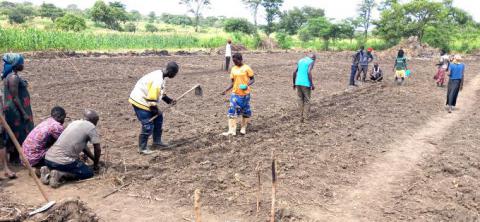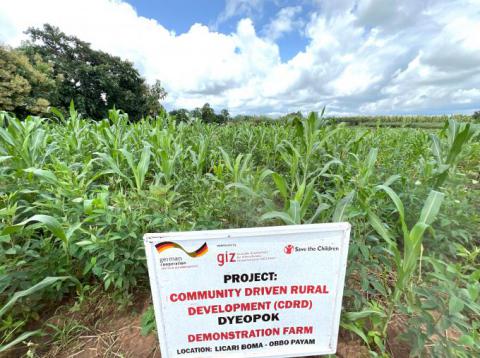A Boost for Farmers to Increase Food Production and Income in Magwi, Eastern Equatoria.
Save the Children trained 75 Agriculture Extension Advisors (AEA) to establish 75 farmer’s groups comprising of 25 members from each group, to increase food production and income in Eastern Equatoria State. More than 1,800 farmers are expected to benefit from the improved farming skills.
MAGWI, SOUTH SUDAN - Food security condition in Magwi, Eastern Equatoria State has been disrupted by the conflict– as of January 2020 characterized by households with a poor Food Consumption Score, moderate hunger, and a negligible population suffering severe food insecurity. The people in Magwi are made up of smallholder farmers - cultivating only private land of a size of less than 1 hectare. They are mostly exposed to precarious food security conditions due to lack of agricultural inputs, skills and access to market. Most of the members were struggling with meeting the cost of living.
With a strengthened community capacities for improved food production and income in Magwi County, South Sudan, Save the Children with funding from Germany Cooperation for Development (GIZ) trained 75 (27 Female & 48M) agriculture community-based extension workers known as Agriculture Extension Advisors (AEA) to improve access to income generating activities and strengthen advisory capacities of women and youths in the agricultural sector. The farmers were selected from each payam, and they graduated on Friday 9th August 2024.
The 75 graduands spent 20 days at the College attending theoretical and practical lessons, 10 days in the field in their respective bomas practicing climate resilient agronomic practices under the guidance of the Technical Vocational and Education Training (TVET) tutors and jointly monitored, coached and mentored by the County and state directors of Agriculture and TVET.
The Agriculture Extension Advisors (AEA) will work together with small holder’s farmers (SHF) by providing training on conservation agriculture, integrated pest management (IPM), post-harvest handling and farming as a business module.
During the training, A total of 26 demonstration plots ave been established. Farmers groups have had an opportunity to visit other demonstration farms to compare and understand on the modalities applied. The primary objective is for SHF to replicates the acquired knowledge at the demonstration centers for application at their various farms to increase crops production and increase income through marketing of excess produce.
The Graduation Day recognized the efforts of the Agriculture Extension Advisors for successfully completing the 30 days training sessions and for passing all the assigned tasks within the course period. Key stakeholders who attended the graduation event included GIZ, County Agricultural Department, Ministry of Agriculture and Forestry, government and local authorities. Each AEA trained will manage one small holder’s farmer group comprised of 25 members where small holder’s farmers learn and compare traditional and new farming technologies at centralized demonstration centers.
Here is what some of the AEA have to say after the graduation.
Catherine, 25, Farmer and AEA
“I came for this training for me to change the standard of agriculture in my community. I stayed here for 20 days in the school. I learned many things; we have TOT training that I was not having the knowledge before, but I gained from this school under the implementation of Save the Children. Then I also gained some knowledge that’s on good agronomic practices. We’re not having that knowledge before, but Save the Children thought…wise to go and select my village, my Boma, where I came from. We’re not having that knowledge of good agronomic practices but due to the one month that we spent, we gained a lot of knowledge and that knowledge we have started now impacting it to our communities. And now I am seeing other changes, that is; one on how to select the site or the land, the type of seed, seed selection, we were also trained on different methods that we can use in order for our farming system to improve”.
Lokang, 35, Former and AEA
“I am a farmer and most of the crops I am producing here are maize, beans, sorghum and cassava. Now we have got a very big difference of doing local planting to these agronomic practices in the community. Now we have a very big change to empower the community. Reaching to when we expand, or reaching to the coming years, we can improve and get more yield than what we have been earning in our community”
Moriko, 30, Farmer, AEA.
“Before coming to Magwi college, I don’t know whether people are planting Simsim in lines but now we have come here at Magwi college, we have learned that people can plant Simsim in lines and the advantage of planting those seeds in lines, it helps [us] to weed the crops. And some of the advantages of planting seeds in line, it will be easy to manage the diseases. I am going to thank GIZ for helping us”.
The Eastern Equatoria Ministry of Agriculture has applauded Save the Children through the support of GIZ in empowering farmers to increase production. Koma John Silvester, Planner and Food Security Analyst at the State Minister of Agriculture Eastern Equatoria says farmers need a harmonized extension packages in terms of policies. This is a requirement he says allows extension officers to render services to the farmers.
Eastern Equatoria State encourages support for farmers to improve productivity.
“We encourage localization, we have to go locally so that the sustainability is ensured. We encourage agriculture as business. Support should be given to farmers who may be coming up. We need to support these private farmers because these private farmers even if they are few, these few farmers can do a lot to feed the people than remaining on just; you produce for food. Subsistence agriculture cannot help us anymore although we cannot stop it, it should be there, but we need to go bigger like other countries. When we have commercial agricultures, they can produce a lot of food, those who cannot produce food can access food in the market cheaply”, said, Koma John Silvester.
Save the Children contracted Magwi College of Agri-business and Management science to conduct the training. The college was established in 2019 with approval from the Government of South Sudan to conduct a 3-year diploma training on agriculture, agri-business, nutrition and business administration including Technical Vocational and Education Training (TVET) programs which runs from a month to 2 years on tailoring, catering, piggery, poultry, auto-machinic, carpentry hair dressing, hospitality, foundation seed training, seed multiplication and public health etc.
Wani William Okwera is the Executive Director of Magwi College of Agri-Business and Management Science.
“What we are doing here is the foundation. In food security, you need to build the foundation, the pillars. If you don’t do that, you cannot achieve the food security we are talking about. Through the training of extension workers, we can realize changes in the production increase in the productivity. We are requesting all the citizens more especially in this region, to send farmers, to send students for agricultural training so that when someone is depending on agriculture, it should not be this agriculture for subsistence farming, it should be commercial agriculture. Farming as a business through giving the business skills and then the component of agriculture we will realize that our farmers may transform from this local production to commercial production”.

Demonstration Farm established by Agriculture Extension Advisors to train more farmers in Magwi, South Sudan
Background / Project information
Magwi County in Eastern Equatoria State falls under the IPC 3 crisis phase, where households are moderately food insecure and apply crisis coping mechanisms like depleting their essential assets to meet minimum food needs. The depletion of assets reduces households’ capacities to withstand future shocks. Subsistence farming is the main livelihood source as farmers produce food and rear livestock mainly for consumption and in some cases, livestock is sold to cover basic needs.
Given the context described above, Save the Children is contributing to improved Community Driven Rural Development through an initiative implemented in Magwi county. The project works with the subnational level administration and the trained AEA to improve the capacities of the targeted beneficiaries to increase agricultural food production and income through promotion of climate resilient and nutrient sensitive agricultural production systems including farming business.
“Save the Children has been working with local authorities and stakeholders to improve access to local and agricultural inputs, strengthening and linking market and build the capacity of farmers to better manage the climate risk through anticipatory actions. This involves advocating for policy change around the government both national, state and most importantly, at the county level. Also facilitating the partnership between the private sector as well as social enterprise so that they get access to some of the markets In Magwi but also outside Magwi, in Torit”, Ahmed Ibrahim, Save the Children’s Director of Programme Operations in South Sudan
Written by: Tito Justin / Save the Children
 South Sudan
South Sudan 